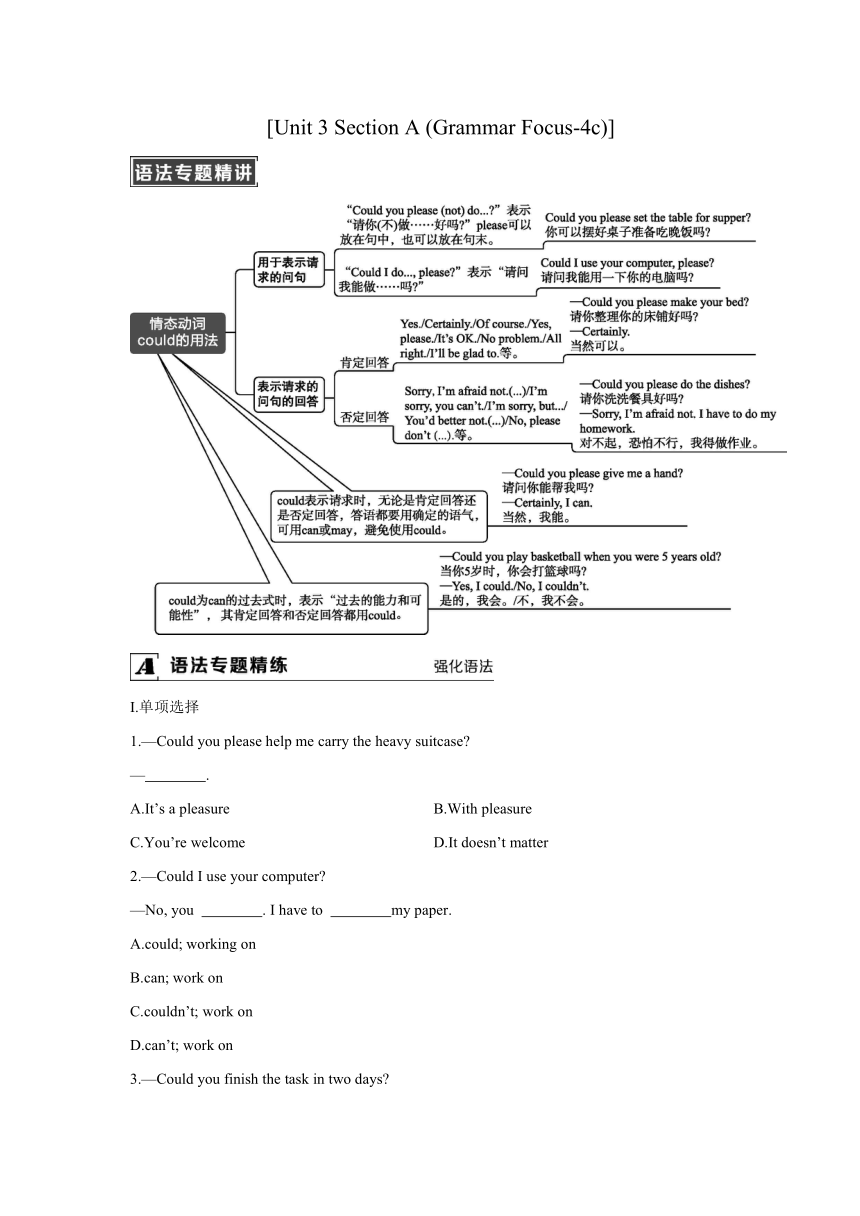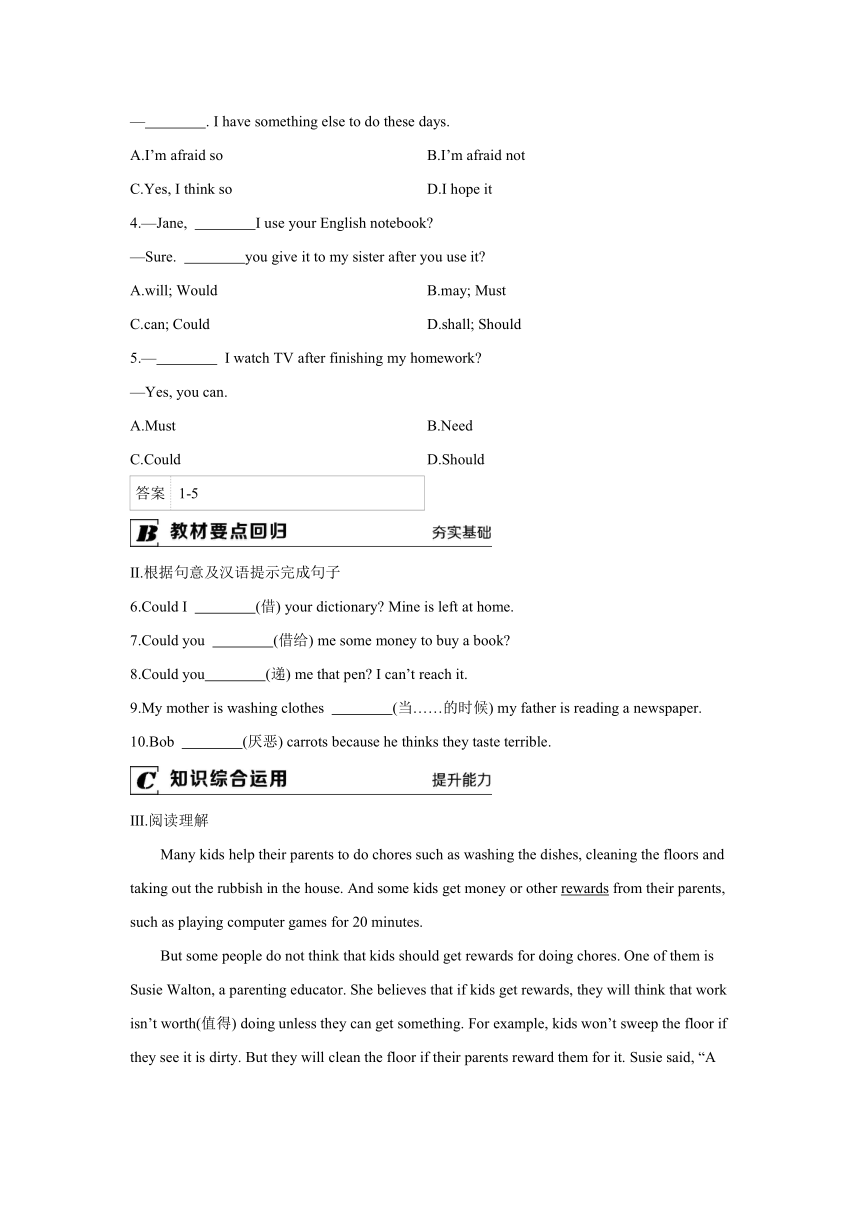八年级下册英语(人教版)同步训练:Unit 3 Could you please clean your room? Section A (Grammar Focus-4c)(含解析)
文档属性
| 名称 | 八年级下册英语(人教版)同步训练:Unit 3 Could you please clean your room? Section A (Grammar Focus-4c)(含解析) |

|
|
| 格式 | docx | ||
| 文件大小 | 454.1KB | ||
| 资源类型 | 教案 | ||
| 版本资源 | 人教新目标(Go for it)版 | ||
| 科目 | 英语 | ||
| 更新时间 | 2022-10-22 00:00:00 | ||
图片预览


文档简介
[Unit 3 Section A (Grammar Focus-4c)]
Ⅰ.单项选择
1.—Could you please help me carry the heavy suitcase
— .
A.It’s a pleasure B.With pleasure
C.You’re welcome D.It doesn’t matter
2.—Could I use your computer
—No, you . I have to my paper.
A.could; working on
B.can; work on
C.couldn’t; work on
D.can’t; work on
3.—Could you finish the task in two days
— . I have something else to do these days.
A.I’m afraid so B.I’m afraid not
C.Yes, I think so D.I hope it
4.—Jane, I use your English notebook
—Sure. you give it to my sister after you use it
A.will; Would B.may; Must
C.can; Could D.shall; Should
5.— I watch TV after finishing my homework
—Yes, you can.
A.Must B.Need
C.Could D.Should
答案 1-5
Ⅱ.根据句意及汉语提示完成句子
6.Could I (借) your dictionary Mine is left at home.
7.Could you (借给) me some money to buy a book
8.Could you (递) me that pen I can’t reach it.
9.My mother is washing clothes (当……的时候) my father is reading a newspaper.
10.Bob (厌恶) carrots because he thinks they taste terrible.
Ⅲ.阅读理解
Many kids help their parents to do chores such as washing the dishes, cleaning the floors and taking out the rubbish in the house. And some kids get money or other rewards from their parents, such as playing computer games for 20 minutes.
But some people do not think that kids should get rewards for doing chores. One of them is Susie Walton, a parenting educator. She believes that if kids get rewards, they will think that work isn’t worth(值得) doing unless they can get something. For example, kids won’t sweep the floor if they see it is dirty. But they will clean the floor if their parents reward them for it. Susie said, “A home is a living place for everyone in the family. It’s important for kids to see that it’s all families’ job to keep their homes clean.”
Other people have different opinions. They believe that money or other rewards can encourage(鼓励) kids to do more chores. It also teaches them real world lessons that we need to work to make money. Now, there are also apps that encourage kids to do chores. The apps give kids points and gifts that can be used either online or in the real world. With the ChoreMonster app, kids get points after doing chores. Kids can exchange(交换) their points for real rewards, such as time to play video games or a trip to the mall.
What do you think Should kids be rewarded for doing chores Or should kids help out around their homes without getting anything
11.How does the writer start the passage
A.By giving some facts.
B.By giving some opinions.
C.By using a teacher’s words.
D.By showing his own experiences.
12.What’s the meaning of the word “rewards” in Paragraph(段落) 1
A.Dreams.
B.Prizes.
C.Exercises.
D.Surprises.
13.Which of the following is Susie Walton’s opinion
A.Don’t ask kids to do housework.
B.Don’t reward kids for doing anything.
C.Don’t give kids rewards for doing chores.
D.Don’t let kids play computer games.
14.What’s Paragraph 3 mainly about
A.How to make money by doing chores.
B.The apps that encourage kids to do chores.
C.How to exchange the points for real rewards.
D.The good side of rewarding kids for doing chores.
15.Where does the passage probably come from
A.A dictionary. B.A storybook.
C.A magazine. D.A guidebook.
答案 11-15
答案
[Unit 3 Section A (Grammar Focus-4c)]
Ⅰ.1—5 BDBCC
Ⅱ.6.borrow 7.lend 8.pass
9.while 10.hates
Ⅲ.[主旨大意] 针对孩子做家务是否应获得奖励,文中给出了两种截然不同的观点。
11.A 细节理解题。第一段介绍了孩子们帮助家长做家务并获得奖励的事实。
12.B 细节理解题。 根据第二段中的 “She believes that if kids get rewards, they will think that work isn’t worth doing unless they can get something.”可知,此处rewards是指做了某件事情之后得到的 “奖励”。
13.C 细节理解题。 根据第二段内容可知, Susie Walton认为不能因为孩子们做家务就给他们奖励。
14.D 细节理解题。通读第三段内容可知,本段主要讲了孩子们做家务并得到一些奖励的益处。
15.C 文章来源题。通读全文可知,本文很可能来自某本杂志。
Ⅰ.单项选择
1.—Could you please help me carry the heavy suitcase
— .
A.It’s a pleasure B.With pleasure
C.You’re welcome D.It doesn’t matter
2.—Could I use your computer
—No, you . I have to my paper.
A.could; working on
B.can; work on
C.couldn’t; work on
D.can’t; work on
3.—Could you finish the task in two days
— . I have something else to do these days.
A.I’m afraid so B.I’m afraid not
C.Yes, I think so D.I hope it
4.—Jane, I use your English notebook
—Sure. you give it to my sister after you use it
A.will; Would B.may; Must
C.can; Could D.shall; Should
5.— I watch TV after finishing my homework
—Yes, you can.
A.Must B.Need
C.Could D.Should
答案 1-5
Ⅱ.根据句意及汉语提示完成句子
6.Could I (借) your dictionary Mine is left at home.
7.Could you (借给) me some money to buy a book
8.Could you (递) me that pen I can’t reach it.
9.My mother is washing clothes (当……的时候) my father is reading a newspaper.
10.Bob (厌恶) carrots because he thinks they taste terrible.
Ⅲ.阅读理解
Many kids help their parents to do chores such as washing the dishes, cleaning the floors and taking out the rubbish in the house. And some kids get money or other rewards from their parents, such as playing computer games for 20 minutes.
But some people do not think that kids should get rewards for doing chores. One of them is Susie Walton, a parenting educator. She believes that if kids get rewards, they will think that work isn’t worth(值得) doing unless they can get something. For example, kids won’t sweep the floor if they see it is dirty. But they will clean the floor if their parents reward them for it. Susie said, “A home is a living place for everyone in the family. It’s important for kids to see that it’s all families’ job to keep their homes clean.”
Other people have different opinions. They believe that money or other rewards can encourage(鼓励) kids to do more chores. It also teaches them real world lessons that we need to work to make money. Now, there are also apps that encourage kids to do chores. The apps give kids points and gifts that can be used either online or in the real world. With the ChoreMonster app, kids get points after doing chores. Kids can exchange(交换) their points for real rewards, such as time to play video games or a trip to the mall.
What do you think Should kids be rewarded for doing chores Or should kids help out around their homes without getting anything
11.How does the writer start the passage
A.By giving some facts.
B.By giving some opinions.
C.By using a teacher’s words.
D.By showing his own experiences.
12.What’s the meaning of the word “rewards” in Paragraph(段落) 1
A.Dreams.
B.Prizes.
C.Exercises.
D.Surprises.
13.Which of the following is Susie Walton’s opinion
A.Don’t ask kids to do housework.
B.Don’t reward kids for doing anything.
C.Don’t give kids rewards for doing chores.
D.Don’t let kids play computer games.
14.What’s Paragraph 3 mainly about
A.How to make money by doing chores.
B.The apps that encourage kids to do chores.
C.How to exchange the points for real rewards.
D.The good side of rewarding kids for doing chores.
15.Where does the passage probably come from
A.A dictionary. B.A storybook.
C.A magazine. D.A guidebook.
答案 11-15
答案
[Unit 3 Section A (Grammar Focus-4c)]
Ⅰ.1—5 BDBCC
Ⅱ.6.borrow 7.lend 8.pass
9.while 10.hates
Ⅲ.[主旨大意] 针对孩子做家务是否应获得奖励,文中给出了两种截然不同的观点。
11.A 细节理解题。第一段介绍了孩子们帮助家长做家务并获得奖励的事实。
12.B 细节理解题。 根据第二段中的 “She believes that if kids get rewards, they will think that work isn’t worth doing unless they can get something.”可知,此处rewards是指做了某件事情之后得到的 “奖励”。
13.C 细节理解题。 根据第二段内容可知, Susie Walton认为不能因为孩子们做家务就给他们奖励。
14.D 细节理解题。通读第三段内容可知,本段主要讲了孩子们做家务并得到一些奖励的益处。
15.C 文章来源题。通读全文可知,本文很可能来自某本杂志。
同课章节目录
- Unit 1 What's the matter?
- Section A
- Section B
- Unit 2 I'll help to clean up the city parks.
- Section A
- Section B
- Unit 3 Could you please clean your room?
- Section A
- Section B
- Unit 4 Why don't you talk to your parents?
- Section A
- Section B
- Unit 5 What were you doing when the rainstorm came
- Section A
- Section B
- Review of Units 1-5
- Unit 6 An old man tried to move the mountains.
- Section A
- Section B
- Unit 7 What's the highest mountain in the world?
- Section A
- Section B
- Unit 8 Have you read Treasure Island yet?
- Section A
- Section B
- Unit 9 Have you ever been to a museum?
- Section A
- Section B
- Unit 10 I've had this bike for three years.
- Section A
- Section B
